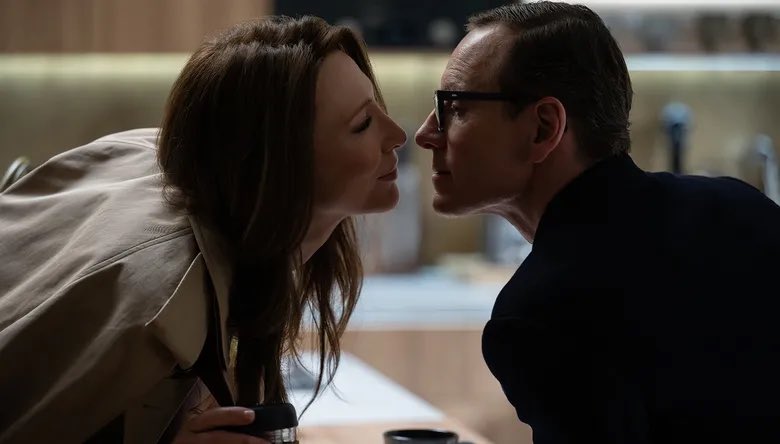If you ever spot Michael Fassbender in the wild, be sure to observe him in motion. Why? Because his body doesn’t just move. It speaks.
In “Shame” (2011), his machine-like jogging spoke of a hopeless hunger for inner peace; in “Frank” (2014), his delicate dancing spoke of childlike joy; and in the “X-Men” films (2011-2019), his commanding gestures spoke of the ability to crush a freight train with the flick of a finger.
“You know, I believe true focus lies somewhere between rage and serenity,” James McAvoy’s Xavier told Fassbender’s Magneto in “X-Men: First Class.” Fassbender’s response was to raise his mighty palm to reorient a satellite dish, a feat I’m not entirely convinced was a visual effect.
Fassbender is in motion once more in “Black Bag,” but he’s not in a rush. Striding through the sterile corridors where his character, George Woodhouse, labors on behalf of British intelligence, he walks just swiftly enough to convey both ease and menace—the epitome of controlled cool.
“Disrupt. All of it,” George sternly decrees as he confronts a bothersome conspiracy. “Bait someone into an overreaction.” Strange sentiment in an undisruptive film that dares audiences to underreact to the effortless brilliance of its director, Steven Soderbergh.
Like Soderbergh’s “Ocean’s” trilogy (2001-2007), “Black Bag” is a less a story than style bath, bubbling with dashing performers, delectable fashions, and a plot both irrelevant and transfixing: George’s search for a turncoat among his colleagues.
“Find the leak!” Arthur Stieglitz (Pierce Brosnan), George’s superior officer, bellows. “Methods won’t be questioned.” Considering MI6 and MI5’s real-life history of torture and abduction, this directive is not reassuring.
Having apparently learned his trade from BBC reruns of “Agatha Christie’s Poirot,” George’s own methods are unusually dignified: He begins by inviting every suspected traitor to dinner, which is quite pleasant until one guest, succumbing to George’s mind games, stabs another in the hand with a steak knife.
“For a minute there, I thought you were human,” seethes Clarissa Dubose (Marisa Abela), the first suspect to grasp the scope of George’s machinations. Unwittingly, she underscores the lesson of “Prometheus” (2012): The more robotic Fassbender’s behavior, the more entrancing he becomes.
Despite the stabbing, a shooting, and an explosion set to Mozart’s “Non Ti Fidar, O Misera,” “Black Bag” is light on action for off-brand Bond. It is also the most exciting Bond movie in years, which says a lot about the sorry state of 007 (who recently became a minion of Blofeld Bezos).

Bond’s sharp tuxes and shoulder holsters would have suited Fassbender, but he may be better off as the smolderingly emasculated George, whose glasses fog up as he cooks not only for his shifty dinner guests, but for his wife, fellow spook Kathryn St. Jean (Cate Blanchett).
“Not everyone aspires to your flagrant monogamy, George,” Meacham (Gustaf Skarsgård), an amused colleague, observes. George may be surrounded by beauties at work (including Naomie Harris, the former Moneypenny), but Kathryn is the one and only Woodhouse girl.
“I watch her,” George says, his voice chilled by desire. “I assume she watches me.” Their marriage is a seductive masquerade, poisoned only by George’s nagging suspicion that Kathryn is plotting to steal Severus, a device that could trigger a nuclear meltdown.
Despite talk of artificial intelligence and Russian skullduggery, the geopolitics of “Black Bag” are beside the point. It is, after all, the sort of film where true evil is telegraphed not by nationality or ideology, but by which character is feasting on a whole, seemingly alive fish.
“Ikizukuri is illegal in the U.K.,” Kathryn admonishes the sushi aficionado in question (for the sake of spoiler-averse moviegoers, I won’t disclose his identity). “If you don’t mind, I prefer to eat alone,” he replies. Boo! Hiss! Yuck!
The ikizukuri, it turns out, is more relevant than Severus, which is just barely the MacGuffin of “Black Bag.” “It’s not really about that anymore, is it?” Kathryn tells George. “Somehow, it’s about us.”
I wouldn’t go that far. Describing “Black Bag” as “a movie about marriage” is like describing “Babygirl” (2024) as “a movie about workplace culture.” “That’s fucking hot,” Clarissa oozes when she learns that George is surveilling Kathryn. “Black Bag”? More like “Fifty Shades of Spycraft.”
In Soderbergh’s “Sex, Lies and Videotape” (1989), Graham (James Spader) is mesmerized by videos of women divulging sexual secrets (“What they’ve done. What they do. What they want to do, but are afraid to ask for”). He gets off on emotional intimacy—not on what is confessed, but on confession itself.
If the characters in “Black Bag” confess little, it’s because to them, everything—marriage, espionage—is a slight, spry game they play at the behest of Soderbergh and screenwriter David Koepp (who specializes in blockbusters, like “Spider-Man,” with a domestic tilt).
“That was the rock, now I watch the ripples,” George announces in the wake of his gory dinner party. Even the tiniest wavelet can leave a spy—or a Soderbergh fan—soaking wet.



